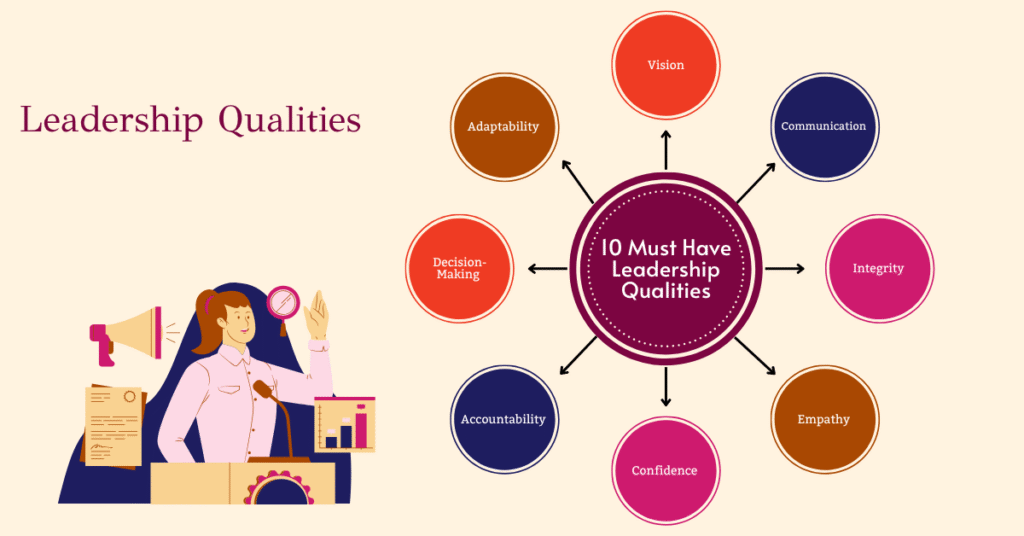Being a leader is about more than just holding a title or position; it’s about influence, responsibility, and guiding others toward a shared goal. Whether managing a business, teaching in a classroom, or leading a community initiative, strong leadership qualities are what truly set effective leaders apart.
Leadership Qualities: What Are They?
The skills and attributes that characterize a person’s ability to lead, motivate, and influence others are known as leadership qualities. These qualities support leaders in building relationships, making wise choices, and producing fruitful results in groups or companies.
The most important traits that each effective leader should possess are listed below.
1. Vision
An outstanding leader knows exactly where they want to go and how to get there. By establishing long-term objectives and demonstrating the significance of their purpose, visionary leaders motivate others. The leader and their team are propelled ahead by this feeling of purpose.
2. Ability to Communicate
The foundation of leadership is effective communication. Leaders need to be able to listen intently, provide constructive criticism, and articulate their thoughts effectively. Effective communication keeps teams in sync, fosters understanding, and lessens conflict.
3. Honesty
Integrity entails acting morally even in the face of difficulty. Because they are truthful, open, and consistent in their choices and behaviors, leaders with integrity win the respect and confidence of others.
4. Self-assurance
Leaders need to have confidence in their skills and talents. They may make choices fearlessly when they are confident, and others are inspired to follow suit. But it’s crucial to strike a balance between humility and confidence.
5. Compassion
It is essential to comprehend the thoughts and emotions of people. Empathetic leaders create inclusive workplaces, promote the welfare of their teams, and handle disagreements delicately and carefully.
6. Responsibility
Effective leaders accept accountability for both their own behavior and the output of their group. When anything goes wrong, they own up to their faults and offer credit where credit is due. This fosters a culture of dependability and trust.
7. Capabilities for Making Decisions
Under pressure, leaders often have to make difficult decisions. Well-informed decision-makers collect data, balance advantages and disadvantages, and choose courses of action that are consistent with their beliefs and objectives.
8. Flexibility
Adaptability is essential in the ever evolving world of today. Great leaders welcome change, maintain their adaptability, and lead their people through new obstacles with fortitude and receptivity.
9. Assigning tasks
Nobody can accomplish it all by himself. Successful leaders are able to trust their teams, delegate duties to the appropriate individuals, and enable others to develop and achieve.
10. Motivation
Genuine leaders inspire people rather than intimidate or control them. They set a good example, acknowledge hard work, and inspire enthusiasm and creativity in people under their direction.
Why Leadership Attributes Are Important
Anyone in a leading position may benefit from having leadership qualities; they are not limited to managers or CEOs. Whether they are students or community activists, cultivating these qualities makes individuals more self-assured, competent, and influential in their positions. Strong leaders create more cohesive, happy, and productive teams that work together to accomplish objectives.
In conclusion
Being a leader is a process rather than a final goal. The majority of leadership qualities may be acquired with time, effort, and practice, while some individuals may be born leaders. Anyone can develop the vision, empathy, and accountability that are necessary for successful leadership and become a more inspirational leader who is prepared to leave a lasting impression.


